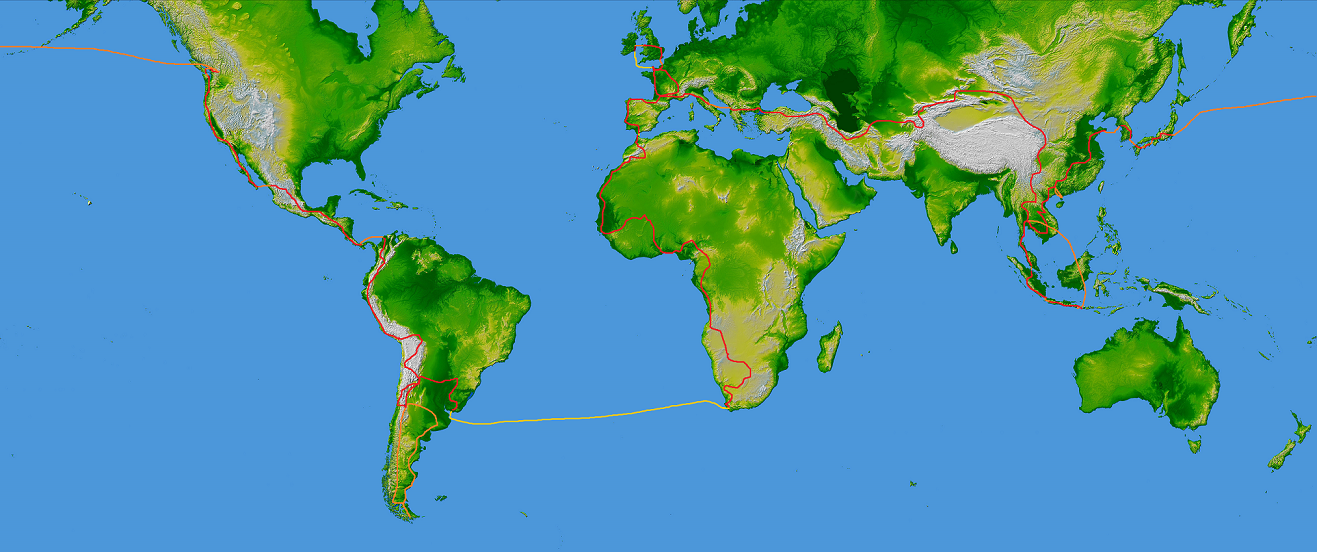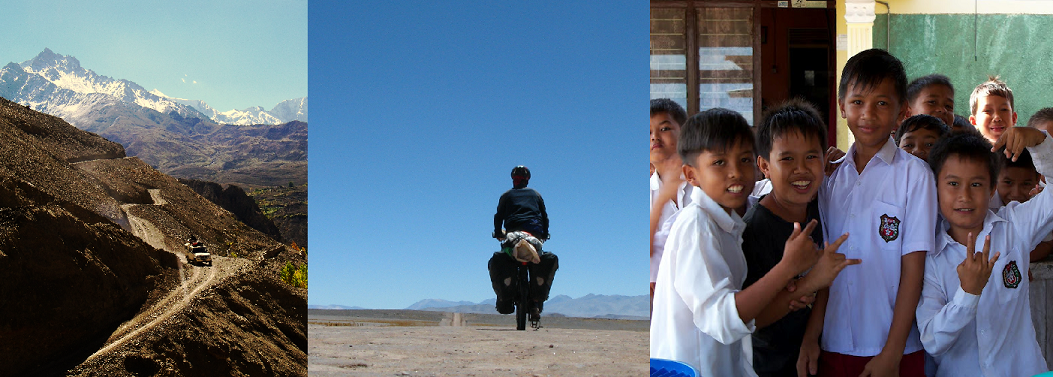Lome, Togo
Trip distance: 12,310 km


 Peter arrives
Peter arrives 
Fellow road hogs
A couple of days are spent lounging around Bolgatanga as Peter gets his energy back after a bout of illness. The thermometer has risen up into the mid-thirties now as the end of the dry season approaches. The heat means that we're often sitting under the shade of a tree in a village, surrounded by curious youngsters who have come to stare at obroni (Ashanti for 'white'). We have also picked up some of the lingo, however, and yells of obroni are met with the now equally loud response of tum-tum (meaning 'black'). It feels quite politically incorrect at first, but it always results in hearty bouts of laughter when uttered. Shops in Ghana are certainly better stocked than in the countries to the north that I've passed through, although once back out in rural areas my poverty indicator kicks in. Our two measurements are the presence of cold Cokes and the range of street food. The latter is particularly tasty in Ghana, especially the sauce from the stew that is spread over rice or spaghetti. In small villages off the beaten track only cooked rice, and perhaps beans, are available to buy. In better supplied settlements spaghetti is also on offer, along with shredded cabbage, hardboiled eggs, and a range of meat stews. Although we normally avoid the latter, all of the former ingredients are combined in varying quantities and have together made up our breakfast, lunch, and dinners for the past three weeks.

Elephants on the Burkina/Ghana border
Two roads led south out of Ghana's northern town of Tamale. Having failed to observe our maps and GPS properly, and instead relying on the road signs, we found ourselves on the road that led directly to Lake Volta, rather than the main route to Kumasi. Our unintended detour led us to the small town of Salaga and then to the banks of the lake at Makango, where we arrived just in time to catch the last fully-laden pirogue across the lake to Yeji. Our arrival on the other side coincided with the weekly departure for the Yaqui Queen, a ferry that plies a route between Yeji in the north and Akosombo in the south. For the equivalent of 15 euro each, we were able to shack up in a two-berth cabin for three nights as we plodded south along the largest artificial lake on the planet towards Accra. The boat made several stops along the route, generally involving large quantities of yams being brought aboard by hand (or head rather). The journey saved us approximately 300 km of pedaling. Perhaps there is a God afterall.

Boys on the bridge over the White Volta, northern Ghana
We negotiated our way into Accra and after a four-hour cycle around the pleasant (and not so pleasant) parts of the city in the humid Valentine's Day afternoon, eventually found a place to rest up for the few days that we anticipate it will take to process our next visa applications for Nigeria and Benin (Togo is available at the border). When I was asked for a destination before I left home or along the way, Accra was the goal that I spoke of. It became clear, however, after a couple of months into the journey that I was finally doing something that I've been wanting to do for many years and I knew that when I arrived in Ghana it wouldn't be easy to give up the freedom of the road. Reaching South Africa had been a frail dream ever since I began planning the trip and over the past few months it began to become an increasingly attractive goal. Some logistical obstacles needed to be overcome, however, if I was to keep cycling. Due to the continually evolving nature of political stability and security in central Africa, finding a viable overland route, either to the east or to southern Africa, always presents a challenge. At present Chad, western Central African Republic, and eastern Democratic Republic of Congo are not very amiable places for either the people who live there or hapless travellers wandering around on bicycles. The only viable option at present is a westerly one, via Cameroon, Gabon, Congo, and Angola to southern Africa, although there are still a couple of bureaucratic hurdles in terms of obtaining visas for some of the countries. This is to be the next stage of the journey.

Stopping by a village on Lake Volta to load up on yams
Accra, Ghana